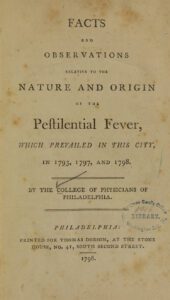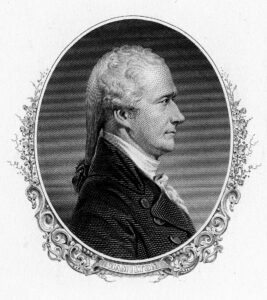
February 10 @ 10:30 am: Join us for a special screening and discussion of Father Ryan: A Higher Call, featuring Deacon DeGaetano from the Basilica of Sts. Peter & Paul. Click here to RSVP for free.

The Chattanooga Public Library presents Politics of Yellow Fever in Alexander Hamilton’s America, a traveling exhibition produced and made available by The National Library of Medicine.
This exhibition explores how the yellow fever outbreak in 1793 Philadelphia influenced politics, future outbreaks, and the development of the nation’s public health infrastructure.
In addition to the National Library of Medicine’s exhibition, viewers will learn about the 1878 yellow fever outbreak of Chattanooga through a companion display from the Library’s Local History & Genealogy Department and a presentation about the Basilica of Sts. Peter & Paul‘s Cause for Sainthood of Father Patrick Ryan, hero of Chattanooga’s 1878 epidemic.
“The history of disease tells us a lot about the human experience,” said Jessica Sedgwick, Head of Local History & Genealogy. “The experience of yellow fever in Chattanooga was devastating, but it was also this amazing moment where people really looked out for each other. I’m thrilled we can present an extensive timeline of yellow fever so that people now can learn more.”
In 1793, yellow fever ravaged Philadelphia. The deadly disease touched nearly everyone in the city: young and old, white and African American, wealthy and poor, religious and secular.
No one really knew what caused the disease or how to treat it.

As yellow fever consumed Philadelphia, politicians debated the disease’s origins, its treatment, and preventative measures. Secretary of the Treasury Alexander Hamilton, a prominent Federalist, favored actions like closing the ports and restricting immigration to stem the epidemic. The medical community, instead, believed the epidemic developed from miasma, or impure air, in Philadelphia.
Within a month of yellow fever’s arrival in Philadelphia, the city, state, and federal governments had essentially stopped functioning. Everyone from elite physicians to quacks, private citizens to elected officials and military officers had an opinion about yellow fever. After scientists confirmed that mosquitoes can transmit yellow fever and other diseases, mosquito control emerged as an important public health measure. The quantity and variety of writing on yellow fever indicates the extent to which it occupied the thoughts of American physicians and shaped the development of the nation’s public health infrastructure.

